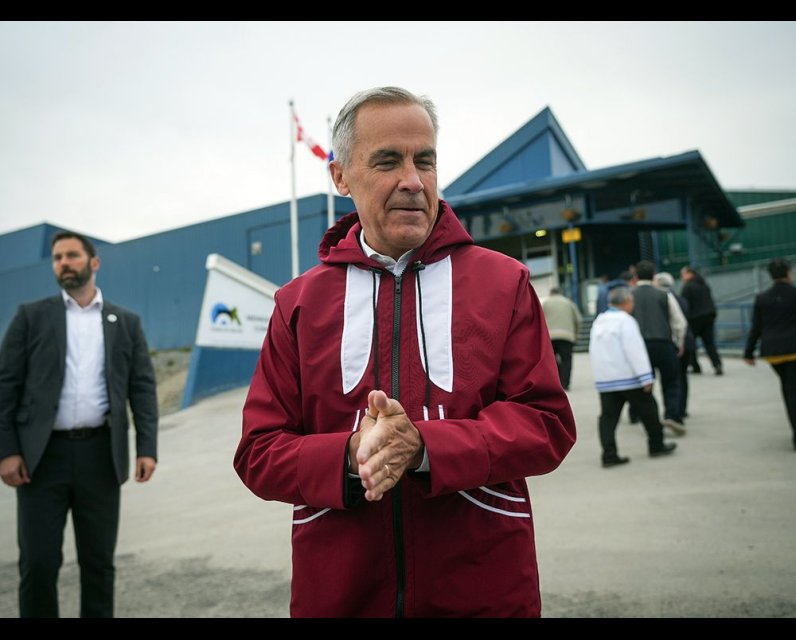Carney tells Inuit leaders his new major projects law ‘fully respects treaty rights’

OTTAWA — Prime Minister Mark Carney told Inuit leaders that his government’s major projects bill “fully respects treaty rights” a week after several Indigenous leaders left a recent meeting with him in a state of frustration , saying their treaties were being undermined.
On Thursday, Carney was taking part in a meeting of the Inuit-Crown Partnership Committee, co-hosted by the president of Inuit Tapiriit Kanatami Natan Obed, in Inuvik, NWT, to discuss Bill C-5, known as the One Canadian Economy Act.
In his opening remarks, the prime minister said he wanted to make “absolutely clear” in the context of this forum on what the legislation could do and what it doesn’t do.
“I want to be clear, up front, that the act fully respects treaty rights, including modern treaties, the modern treaties with Inuit treaty organizations. It fully respects treaty-based environmental assessment processes,” he said.
“In fact, those will be essential for anything that we move forward,” he added.
Minister of Crown-Indigenous Relations Rebecca Alty added: “At the end of the day, treaties are above this law. They have to be respected, and that’s always been the case with this bill.”
According to the government of Canada’s website , treaties are agreements made between the Crown, Indigenous groups that define rights and obligations. They include historic treaties and modern treaties, also called comprehensive land claim agreements.
Treaties are enshrined in section 35 of the Constitution Act. In 2021, the Liberal government passed legislation to make sure all federal laws are consistent with the United Nations Declaration on the Rights of Indigenous Peoples, which relates to treaty rights.
Assembly of First Nations (AFN) National Chief Cindy Woodhouse Nepinak had raised some alarm bells about C-5 before it was tabled and passed in June , saying that the proposed bill suggested “a serious threat” to the exercise of treaty rights by First Nations.
The legislation, which was fast-tracked in Parliament to become law in late June, gives Carney’s cabinet the authority to designate projects, such as pipelines, ports and highways, in the “national interest” and speed up the federal approvals process.
In response to criticism from Indigenous leaders who said they had not been properly consulted on the bill, Carney announced he would be holding three summits.
A first meeting with First Nations was held last week in Gatineau. Carney met with Inuit leaders in Inuvik on Thursday and he is set to meet with Métis leaders sometime in August.
After last week’s meeting, Alberta First Nations chiefs held a press conference to reaffirm their opposition to the legislation which they said does not respect treaty rights.
“This bill aims to include First Nations in a unified economy, but in reality, it undermines treaty and inherent rights by assimilating us into a system that did not create consent,” said Vernon Watchmaker, chief of Kehewin Cree Nation.
“A few invited voices do not speak to the treaty relationship of the diverse nations across Turtle Island (Canada),” he added.
Chief Sheldon Sunshine, of Sturgeon Lake Cree Nation, took issue with the government’s plan for an Indigenous advisory council which will be a part of the major projects office that will move projects ahead. Carney has said the office will be up and running by Labour Day.
Sunshine said the proposed council, which will include First Nations, Inuit and Métis representatives, is a “colonial construct” and “not grounded in treaty relationships.”
“Its existence and operation undercut our treaty rights by placing our futures in the hands of an unelected body and reports to the Prime Minister’s Office, not to our people,” he said.
“It is used to divide and dilute Indigenous voices, creating the appearance of inclusion while excluding those who assert inherent and treaty-based jurisdictions.”
In a recent interview with National Post, Deliah Bernard, former Indigenous affairs adviser to prime minister Justin Trudeau, said there is “no one-size-fits-all approach to what consent should and could look like” with Indigenous groups.
“There are going to be regional disparities. There are going to be regional priorities. There are going to be circumstances that impact a community in one subsection of the country that necessarily may not impact in the same way… different parts of the country.”
“That’s why the principle of consultation and consent is so crucial and so critical,” said Bernard, now co-founder of the Indigenous affairs agency Roots Strategies.
Carney underscored last week that his government was only at the starting point of a much longer consultation process that would have to unfold with individual communities.
He also promised to put $40 million towards ensuring Indigenous leadership is involved in further discussions, including on the question of which projects should be fast-tracked.
Indigenous Services Minister Mandy Gull-Masty pointed to how having Indigenous participation was part of the criteria for determining which projects would make the cut, referring to comments made by Carney directly to First Nations chiefs last week.
“The likelihood of these projects advancing or being completed without Indigenous people at the table… to me, sounded like zero,” Gull-Masty said.
While in Inuvik, Carney also announced the appointment of a new Arctic ambassador. Virginia Mearns, an Inuit leader based in Iqaluit who held senior positions in the government of Nunavut, will start her mandate effective September 15.
In this role, Mearns will focus “on reinforcing Canada’s Arctic engagements with like-minded partners and multilateral forums, bolstering Arctic sovereignty Arctic sovereignty, and advancing opportunities for security and growth” according to Carney’s office.
— With additional reporting from Stephanie Taylor.
National Post calevesque@postmedia.com
Our website is the place for the latest breaking news, exclusive scoops, longreads and provocative commentary. Please bookmark nationalpost.com and sign up for our newsletters here.

Comments
Be the first to comment